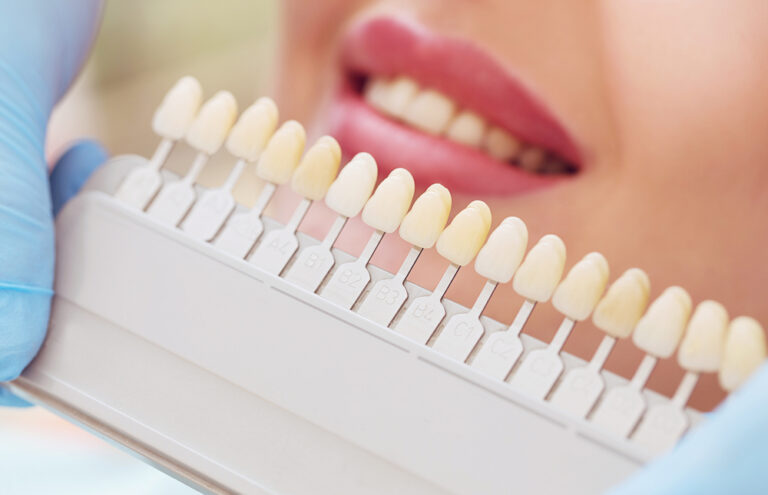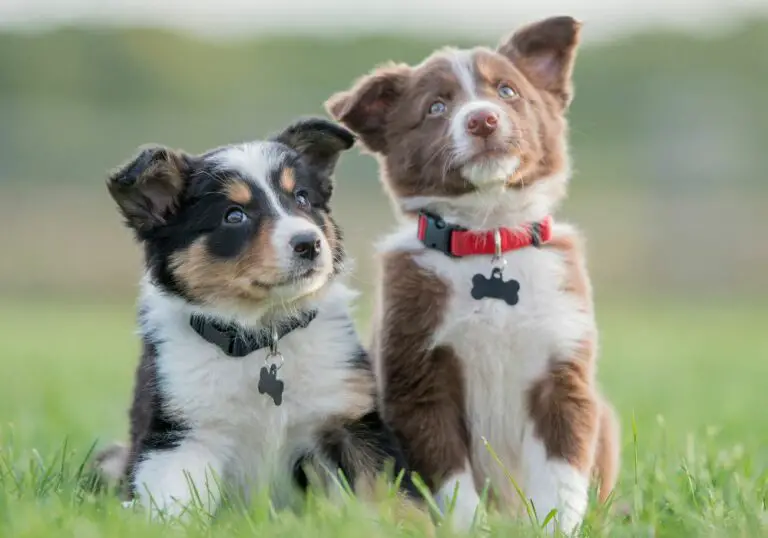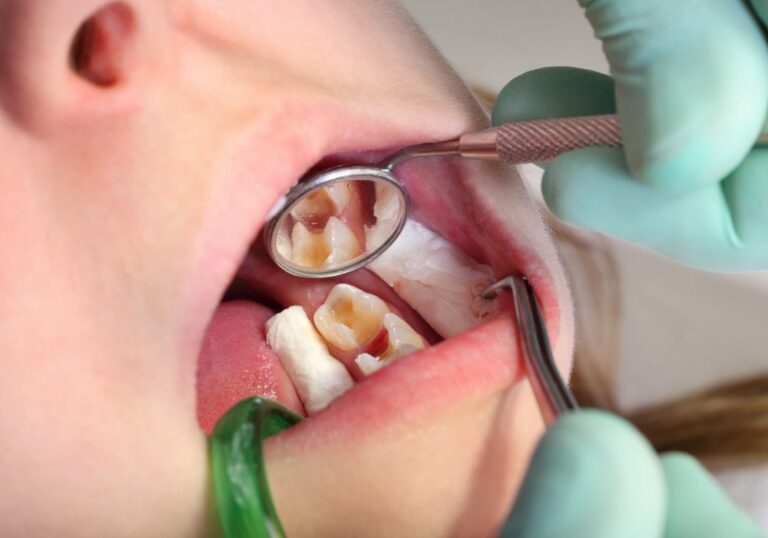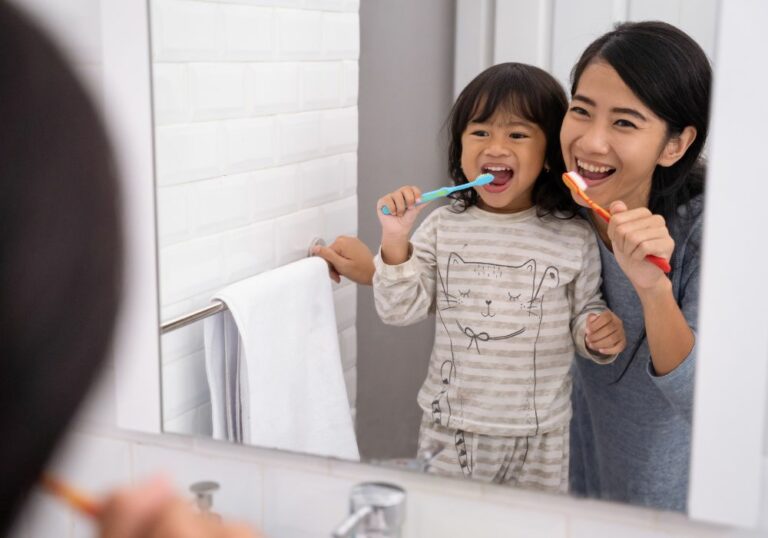Overview of rabbit teeth
Rabbits have 28 teeth that are constantly growing. Their teeth include:
- Incisors – The front top and bottom teeth used for biting off food. Rabbits have 2 pairs of incisors on top and 1 pair on the bottom.
- Premolars – Located behind the incisors on the top and bottom, used for grinding food. Rabbits have 3 premolars on each side of the top and bottom.
- Molars – Located at the far back of the mouth, also used for grinding. Rabbits have 2 molars on each side of the top and 3 on each side of the bottom.
The incisors and premolars of rabbits grow approximately 2-3 mm per week. This is because they lack a layer of enamel on the back of their teeth that protects against wear. Since rabbit teeth grow continuously, they need to worn down through the natural act of grazing and chewing to prevent overgrowth.
Normal wear vs overgrown teeth
- Normal wear – With a proper diet of grasses, hay, and other abrasive foods, rabbit teeth grind against each other and wear down at an even rate. This keeps the teeth at a normal length.
- Overgrown teeth – If a rabbit’s teeth aren’t grinding enough, they can become overgrown. The upper incisors will grow longer and curve to form a tusk shape. The lower incisors and cheek teeth may also overgrow.
Signs of overgrown teeth
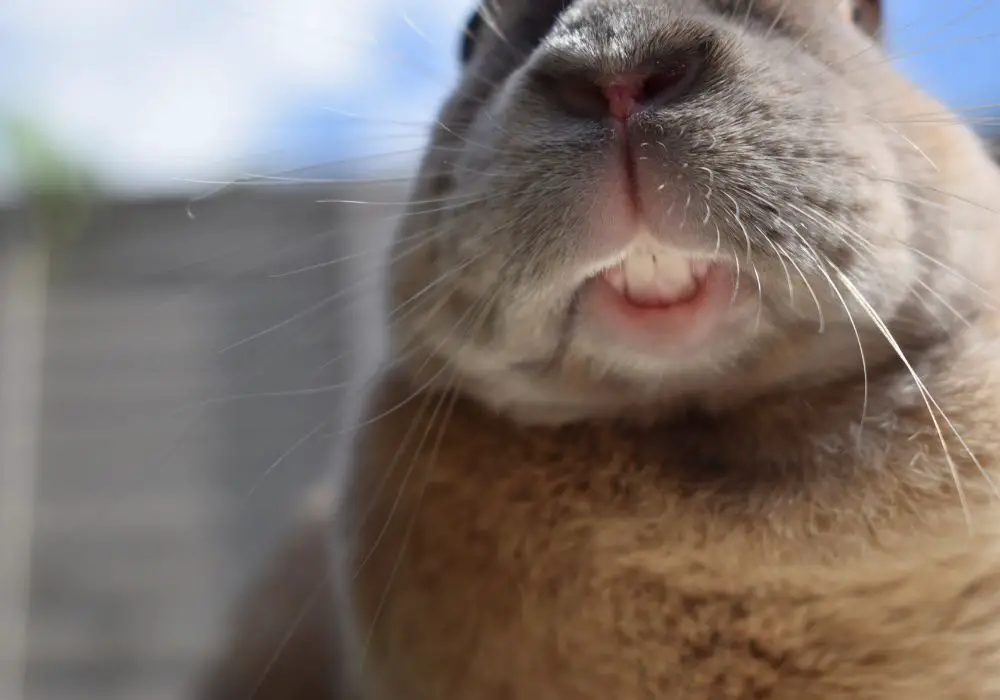
There are several signs that may indicate a rabbit has overgrown teeth:
- Difficulty eating – A rabbit may show signs of mouth pain, drool, or drop food from its mouth. Overgrown incisors make it hard to bite off pieces of food.
- Weight loss – Rabbits stop eating normally once teeth are too long, leading to gastrointestinal issues and weight loss.
- Spikes or points on the incisors – The upper incisors will form sharp spikes or tusks when overgrown.
- Misaligned bite – With one or more overgrown teeth, the bite alignment gets thrown off.
- Runny eyes – Tears may run down the face as overgrown molar roots push into tear ducts.
- Head tilting or chewing on one side only – Uneven tooth growth leads to preferring one side.
- Lethargy – Once a rabbit is in dental pain and unable to eat properly, they become less active.
When are teeth considered overgrown?
Teeth are generally considered overgrown when:
- Upper incisors extend more than 1 cm past the gumline
- Lower incisors are visible when the mouth is closed
- Cheek teeth extend past the height of normal opposing teeth
Can rabbits eat with overgrown teeth?
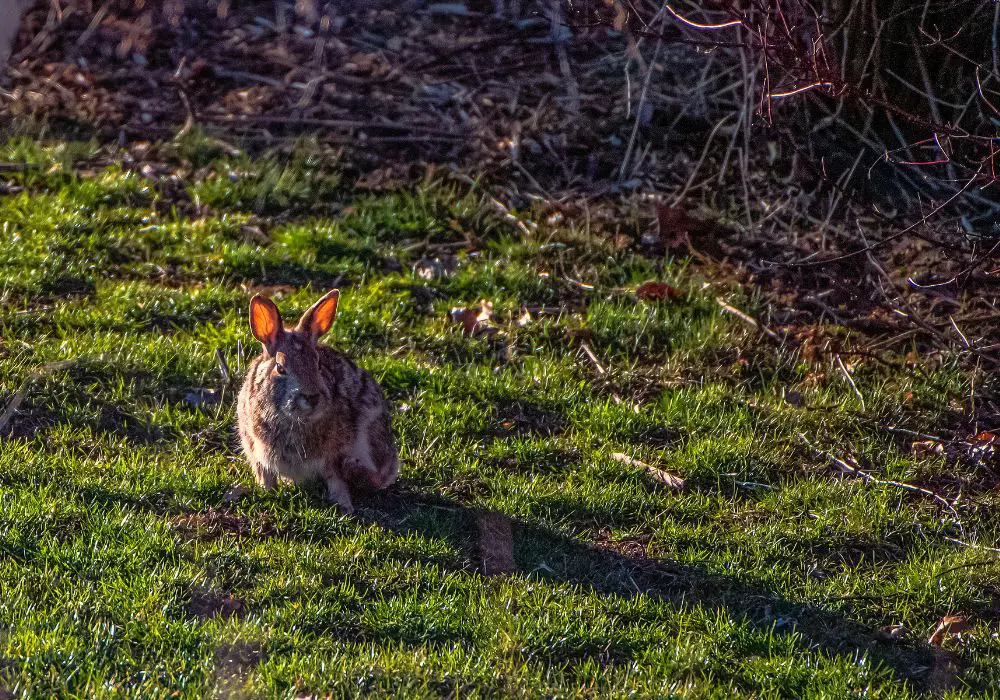
Ability to eat
Rabbits can still eat and chew to some degree when their teeth are overgrown, but with difficulty. How well they can eat depends on:
- Which teeth are affected – Incisor overgrowth affects biting, while cheek teeth affect chewing. If all teeth are very overgrown, eating is extremely difficult.
- How severely overgrown the teeth are – Slight overgrowth may just cause minor discomfort. Very severe overgrowth makes eating nearly impossible.
- The rabbit’s pain tolerance – Some rabbits continue trying to eat despite significant dental pain. Others stop eating with even mild overgrowth.
While rabbits technically can still eat with overgrown teeth, their ability to properly gnaw off and chew food is impaired.
Effects of overgrown teeth on eating
When rabbits eat with overgrown teeth, they are likely to experience:
- Pain – Putting pressure on overgrown teeth and infected roots causes mouth pain. Rabbits may chew very slowly.
- Drooling – The mouth tends to produce excess saliva when painful. Rabbits may drool or get food wet with saliva.
- Selective eating – Rabbits favor soft, wet foods like leafy greens that hurt their mouth less over hay and pellets.
- Weight loss – Difficulty chewing and mouth pain causes rabbits to eat less. If overgrowth is severe, they may stop eating entirely.
- Chewing on one side – With uneven overgrowth, rabbits will only chew on the less painful side of their mouth.
- Spilling food – Food is more likely to fall out of the mouth with reduced chewing ability.
- GI issues – Swallowing poorly chewed food can cause gastrointestinal upset.
So while rabbits with overgrown teeth can physically eat, doing so becomes increasingly painful and difficult. Their eating ability is substantially impaired.
How long can rabbits go with overgrown teeth?
Rabbits can potentially live for a few weeks to a month with mildly overgrown teeth before their health is severely impacted. However, leaving overgrown teeth untreated is extremely inadvisable.
With moderate to severe overgrowth, rabbits may only be able to eat for a few days to a week before refusing food entirely. Severely overgrown teeth should be treated as a dental emergency.
Prolonged overgrown teeth also allow bacteria to penetrate exposed root tissue, putting rabbits at risk of tooth root abscesses and infection spreading to the jaw, face, and body. Overgrown teeth can be life-threatening within a matter of days if left untreated.
Providing care for overgrown teeth
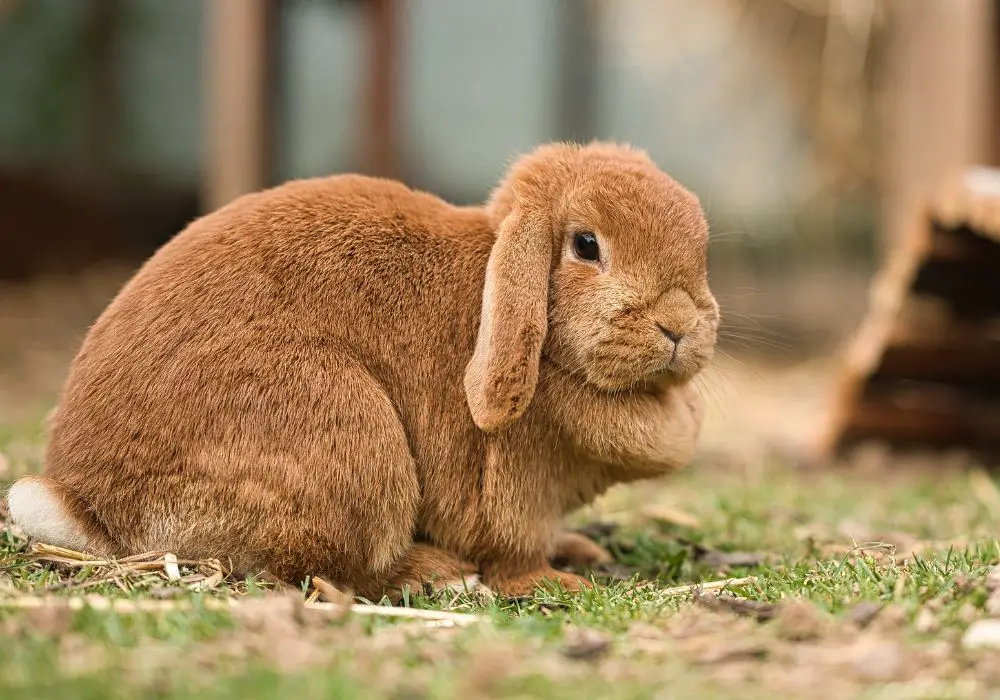
Home care options
If a rabbit has mildly overgrown teeth, owners may try:
- Giving more hay and grass mats to encourage chewing
- Feeding pelleted food instead of mixes with treats
- Offering wet leafy greens to make eating easier
- Applying flavored vitamin supplements to water
- Scheduling a vet dental trimming within 1-2 weeks
However, home care has limited effectiveness with moderate to severe overgrowth. Vet treatment is needed.
Professional dental care
Veterinarians use the following methods to correct overgrown teeth:
- Teeth trimming – Shaving overgrown portions of the teeth down to normal height using a dental drill. This provides immediate relief.
- Tooth extraction – Pulling severely damaged or infected teeth. This may be done along with antibiotics.
- Abscess drainage – Draining pus from tooth root abscess and flushing the wound. Antibiotics are given.
- Jaw support – Wire or acrylic braces may support the jaw if infection has caused bone damage.
- Ongoing teeth maintenance – For rabbits prone to overgrowth, teeth trimming every 4-8 weeks prevents recurrence.
With prompt professional treatment, most rabbits with overgrown teeth can return to normal eating relatively quickly. Their teeth then need to be monitored closely and trimmed routinely to prevent re-overgrowth.
What if teeth can’t be trimmed?
In rare cases, a rabbit’s teeth may be so severely overgrown or their mouth infected that sedation and trimming isn’t safe. Other options include:
- Extracting all incisors and premolars, leaving molars for some chewing ability
- Frequent syringe feeding until antibiotics resolve infection enough to trim teeth
- In very severe cases, euthanasia may be considered if there is no chance teeth could recover
Preventing overgrown teeth
Here are some ways rabbit owners can help prevent overgrown teeth:
- Provide unlimited hay – Grass hay like timothy should make up majority of diet to promote chewing.
- Feed a dental pellet diet – Some pellets are formulated for better chewing and wear.
- Give chew toys – Wooden blocks, twigs, and straw balls encourage gnawing.
- Limit sugary treats – Treats are okay in moderation, but don’t replace hay chewing.
- Get annual dental checks – Even with prevention, molars may need trimming.
- Watch for early signs – Catching slight overgrowth early makes treatment easier.
With proper husbandry and dental care, overgrown teeth can often be avoided in pet rabbits. But they require attentive owners to stay on top of their dental health.
Frequently Asked Questions
Here are some common questions and answers about rabbits eating with overgrown teeth:
Q: How can you tell if a rabbit is having trouble eating due to overgrown teeth?
A: Signs include dropping food, wetting food with drool, selectivity eating soft foods, weight loss, chewing very slowly, and crying out in pain when eating. Rabbits may also chew on just one side.
Q: Is it okay to just trim a rabbit’s overgrown incisors at home?
A: No, the cheek teeth also need checked and trimmed by a vet. Incisors will quickly overgrow again if underlying cheek tooth problems aren’t addressed.
Q: Can overgrown teeth correct themselves if a rabbit starts eating more hay?
A: No, overgrown teeth require professional dental work to shorten them. Just improving diet after they are already overgrown will not correct the problem.
Q: How urgent is it to have overgrown teeth treated?
A: Moderately to severely overgrown teeth should be treated within 1-2 days to avoid worsening problems. Rabbits may stop eating entirely once teeth are too overgrown.
Q: After dental work for overgrown teeth, how long does it take for a rabbit to recover normal eating?
A: With prompt treatment, most rabbits are able to resume normal eating in 3-7 days as pain and inflammation resolve. Full recovery takes several weeks of close monitoring.



